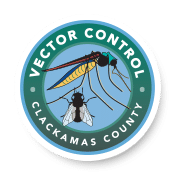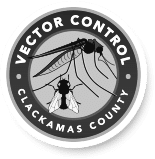Mosquito Control Around Your Home
Learn How to Protect Your Home from Becoming a Mosquito Breeding Ground
Many of the mosquitoes found around your home have bred on or around you or your neighbor’s property. Mosquitoes require standing water for their production. Eliminating standing water early in the spring will reduce the production of those summer mosquitoes.
Here are a few ideas for searching out and eliminating potential breeding grounds for mosquitoes:
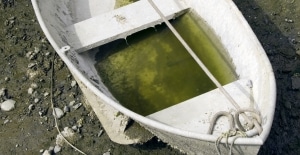
- Keep bird baths and ornamental ponds clean. In warm weather, change water weekly. Call the Vector Control District to have Gambusia affinis placed in your pond.
- Remove leaves from gutters so water will flow freely. Fill or drain puddles, ditches and swampy areas.
- Eliminate standing water around animal watering troughs.
- Check around faucets and air conditioner units and repair leaks and eliminate puddles that remain for several days.
- Dispose of, or store in a dry place, any cans, bottles, tires, and any other containers that hold water.
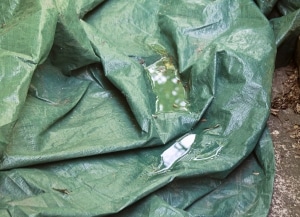
- Cover boats or store upside down or in a dry place.
- Where feasible, fill all holes in the trees on your property.
- When swimming season is over, empty and store wading pools in a dry place. Cover large pools and check frequently to insure against mosquito breeding. Pool chemicals like chlorine, at ordinary concentrations, will not kill mosquito larvae.
Remember
Elimination of standing water must be done no later than early April to reduce later mosquito problems. Continue to monitor potential breeding grounds throughout the summer.
Ornamental Ponds
Stock the ponds with mosquito fish, you can even add goldfish for looks if you desire. Avoid spraying the pond with garden insect sprays and don’t chlorinate the pond, it kills the fish! If you need to clean the pond, put the fish into a small glass bowl and then clean. Remove leaves and thin out pond lilies from the pond, always keeping the water level up. Always remember to keep the inlet of the recirculating pump screened. If the pond is no longer desired, you can always break holes in the bottom of the pond and fill the pond with dirt or sand.
Concrete or Plastic Swimming Pools
Operate filter and skimmer every day to remove egg rafts and larvae. Provide drainage for filter and pump sumps. Chlorine will not kill mosquito larvae. If the pool cover is used, keep it tightly sealed. Remove rainwater from the top of pool covers, so that the mosquitoes have no chance to lay eggs. Stock unused or “out-of-order” pools with mosquito fish, or make ornamental ponds out of them.
Boats
Prevent accumulation of bilge water. Store small boats upside down or cover to keep out the rain and water from sprinklers.
Animal Water Troughs
Stock large troughs with mosquito fish, dealing with smaller troughs requires cleaning every week.
Other Kinds of Containers
Remove and dispose of all unused containers that will collect rain or water from sprinklers. These containers include: cans, jars, barrels, old tires, buckets, tubs, etc. Home gardeners rooting plant cuttings in vases, buckets, etc., should change water every week.
Usable containers should be stored upside down.
Facts About Gambusia Affinis – “Mosquito Fish”
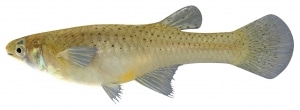 Gambusia affinis are indispensable to our mosquito control program.
Gambusia affinis are indispensable to our mosquito control program.
Mosquito fish are furnished — without charge — for stocking ornamental ponds, unused or out-of-order swimming pools, and animal troughs.
They require no feeding and care is limited to protecting them from garden sprays and chlorine or other chemicals used to clean ponds.
Mosquito fish do not lay eggs, but rather give birth to well developed and very active young. Therefore, they require no special environment, as other fish do, for depositing and hatching their eggs.
They breed throughout the summer and new broods are produced at intervals of about six weeks, with 50 to 100 young in a single brood. The young are about 1/4 inch in length when born and are ready to begin their work of eating larvae at once.
Gambusia affinis grow rapidly, reaching a maximum size of about three inches. The earliest broods of the season, born in April and May, become sexually mature and produce young when six to eight weeks old.
Personal Protection from Mosquitoes
May and June are frequently the worst months in our area for mosquitoes. The Vector Control District controls mosquitoes in large breeding areas on public and private property, but cannot find and control backyard breeding sources where neighborhood mosquitoes develop.
For a more enjoyable spring and early summer, we offer the following suggestions:
- Follow the preventive measures indicated previously.
- Avoid peak periods of mosquito activity. In May and June, plan your outside activities to avoid the peak times of one hour before to one hour after sundown.
- Wear protective clothing or use mosquito repellent when you must be exposed to mosquitoes outside. Although somewhat less effective than repellents, oil of citronella is another type of mosquito repellent for outside use. It is the active ingredient in many of the candles, torches, or coils that may be burned to produce a smoke which repels mosquitoes. These are useful outdoors only under windless conditions.
